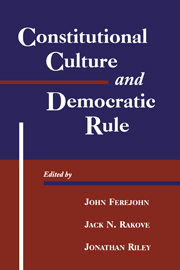Book contents
- Frontmatter
- Contents
- List of Contributors
- Editors' Introduction
- PART ONE CONSTITUTIONAL BEGINNINGS AND TRANSITIONS
- PART TWO CONSTITUTIONAL STRUCTURE AND DESIGN
- 4 Constitutional Democracy as a Two-Stage Game
- 5 Imagining Another Madisonian Republic
- 6 One and Three: Separation of Powers and the Independence of the Judiciary in the Italian Constitution
- 7 A Political Theory of Federalism
- PART THREE CONSTITUTIONAL CHANGE AND STABILITY
- Name Index
- Subject Index
6 - One and Three: Separation of Powers and the Independence of the Judiciary in the Italian Constitution
Published online by Cambridge University Press: 20 March 2010
- Frontmatter
- Contents
- List of Contributors
- Editors' Introduction
- PART ONE CONSTITUTIONAL BEGINNINGS AND TRANSITIONS
- PART TWO CONSTITUTIONAL STRUCTURE AND DESIGN
- 4 Constitutional Democracy as a Two-Stage Game
- 5 Imagining Another Madisonian Republic
- 6 One and Three: Separation of Powers and the Independence of the Judiciary in the Italian Constitution
- 7 A Political Theory of Federalism
- PART THREE CONSTITUTIONAL CHANGE AND STABILITY
- Name Index
- Subject Index
Summary
Funiculus triplex difficile rumpitur
(A threefold cord is not easily broken)
Ecclesiastes 4.12INTRODUCTION
In contemporary democracies electors can choose their representatives, reward them by reelection, or turn them out of office; no appeal can be made against a judgment as final or conclusive as an election. However, electors cannot bind representatives, once elected, in the choices they make as legislators. Representatives have a power constitutionally unbound from any promise they may have made during the campaign; a freedom that also entails a risk, because they may be punished at the next election, but only if the voters hold them to their promises. The ban on “imperative mandates” is one of the central tenets of modern representative government.
Rousseau famously held, not without reason, that the citizens of representative governments – which we call democracies with a small abuse of language – are, like the English, free only for one day, the day of the elections, and slaves the rest of the time. Unfortunately, Rousseau failed to suggest any clear or sensible alternative to that extreme and bleak verdict. Perhaps unintentionally, he eventually opened a path that leads nowhere, or rather, toward the utopia that some still vaguely call “direct democracy.”
In addition to the rejection of representative government, another aspect of Rousseau's theory of democracy deserves emphasis: its nonconstitutionalist thrust. Rousseau in fact did not distinguish between ordinary and constitutional laws. He had no conception of the supremacy or “superlegality” of the constitution; nor did he notice the critical difference, pivotal in any contemporary Rechtstaat, between the constituent power that establishes the constitution and the subordinated powers, such as the legislative, that carry out their constitutionally delegated duties.
- Type
- Chapter
- Information
- Constitutional Culture and Democratic Rule , pp. 205 - 222Publisher: Cambridge University PressPrint publication year: 2001
- 3
- Cited by



